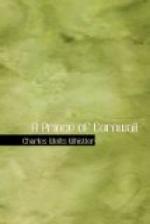So Elfrida had a hopeless slave at her beck and call, and by and by I was on the old footing, and we used to make much of my vow of service to her.
“I would that I had made that vow,” Erpwald said once.
“It is not too late now,” answered the ealdorman, with his great laugh; “but I do not think it is needed.”
After me went Erpwald when he was not at the ealdorman’s, and Ina told me that he was glad to see that I harboured no thought of revenge.
“Presently you will want to go to Eastdean to see that your father’s grave is well honoured, and this friendliness will help you,” he said. “And for his friend such a man as Erpwald will do much. The church at Eastdean will be no poor one, and you will help him choose the place. We could not have asked him to do anything that has pleased him more.”
One thing I feared was that when he found out who I was he would be ill at ease with me, and I asked the king to tell him in the way that seemed best to his wisdom, lest the knowledge should come by chance from some one else.
So he did that, and in a day or two Erpwald came to me and told me that he knew at last who I was, and we had a long talk together. It was in his mind to try to make me take the lands again, and I had hard work to make him believe that I was in earnest when I said that I did not want them. And at the end I made him happy by telling him that the king would let me go to Eastdean with him before long, so that we could see to things together.
“Well,” he said, “this is all very pleasant for me, and it is common saying that you will be some sort of prince in West Wales before long; but I shall ever feel that my family owes yours more than I can repay.”
After that he was a little uneasy with me for a time, but it soon wore off, and we used to talk of our ride to Eastdean often enough.
And then happened a thing that set me back into trouble about Owen again. I had had many messages from him, as may be supposed, and in all of them he said that there was no sign of danger, or even of plotting against him.
One of my men brought me a written message one evening. A thrall had left it at the gate for me. And when I asked from whom it came I had the same answer that was given me when that other writing warned me not to sleep in the moonlight, for it was said to come from a priest whom I knew.
So when I glanced at the writing I was not surprised to see that it was the same, though the sight of it gave me a cold shudder. Somewhat the same also was the form in which the message ran:
“To Oswald, son of Owen.—It is not good to take wine from the hand of a Briton.”




